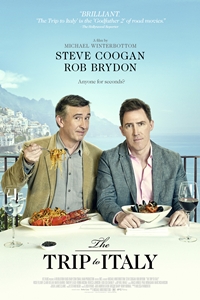 The Trip to Italy
The Trip to Italy
Starring Steve Coogan, Rob Brydon, Rosie Fellner, and Claire Keelan
Directed by Michael Winterbottom
Not Rated
Run Time: 108 minutes
Genre: Comedy/Drama
Opens August 29th
By Eric Forthun of Cinematic Shadows
The Trip to Italy is a more incisive, spontaneous film than the first entry from 2011. Much like its predecessor, the film was cut from a series of episodes from the British television show into a feature-length theatrical release. Both films feel episodic and highly improvised due to the nature of the filmmaking itself and the terrific comedic actors on screen, Steve Coogan and Rob Brydon. They elevate this sequel to more sweeping, personal heights. The comedy feels more ripe since it is less reliant on immature conversations but rather allegories about the characters’ lives and the acceptance of growing up past their sophomoric, babbling comedy. The comedy doesn’t always work, as is inherent with improvisational humor in a structured setting, but the final half hour adds a level of poignancy and artistry to the storytelling that makes the comedy tragically insightful. These are flawed characters who use their comedy to escape their depressing personal struggles.
The story is simple: two men, Steve and Rob (playing versions of themselves), travel to Italy for six meals in six different places. They visit restaurants in Liguria, Tuscany, Rome, Amalfi, and Capri, along with side adventures to the ruins of Pompeii and the Roman catacombs. What’s striking about the film is that the premise should rely heavily on the food itself, yet the characters always put that on the back burner. The structure is similar to the first in that the scenes show the chefs preparing the food while cutting between the conversation in the dining room, and there’s a a certain twist on those elements from the first time around. The Trip established Steve as a promiscuous, rambunctious sort that didn’t have the level of success and recognition as Rob, making him a more bitter and inherently more lonely man. This narrative, however, focuses on Rob’s utter inability to sustain his marriage and using his impressions to escape the sad state of his own reality. The story allows harkens back to his personal turmoil and uses that to fuel conversations at lunch.
Buddy comedies don’t usually frame themselves as character studies but rather narratives filled with eccentric characters butting heads with one another. The Trip to Italy shatters that with its independent storytelling leanings, opening and closing with shots of the same character each capturing a transformation. Steve feels like the center of the story due to those bookends despite his career not progressing as rapidly as Rob’s. The latter gets the opportunity to audition for a role in a Michael Mann film over in the States; he constantly describes it as the lead despite knowing that he dies halfway through and acts as the mob’s accountant. But hey, he can brag about it if he wants. Nonetheless, this fuels Steve’s jealousy alongside Rob’s supposedly successful, happy marriage. My, how things have changed from the first film, with Rob now struggling to maintain a connection with his wife long-distance while she is busy taking care of the kids. He also cheats on her with a young woman that finds him hilarious, so naturally things are a little rough.
Impressions remain the focal point of the comedy and both actors bring their best voices. The dueling Michael Caines return, where the characters now talk about his work in The Dark Knight Rises and constantly argue that the other simply isn’t doing it right. There are also little glimpses of Dustin Hoffman, Woody Allen, Christian Bale, and Tom Hardy (as Bane, of course). While those are the main attractions for laughs, the film shines when it allows the characters to make observational humor, like a genius interaction at Pompeii discussing a man trapped in a glass box. In those tiny moments the film feels like a strangely brilliant beast. Coogan and Brydon bring a conversational nature to the film with their natural exchanges, reacting wholeheartedly to the other’s offbeat, unwritten jokes. These characters are sad and lonely for most of the film’s duration even if that never emerges at the surface. The final ten minutes are quietly, methodically biting, proving that The Trip to Italy is a comedy that feels light until it delivers a gut-punch of a conclusion.









